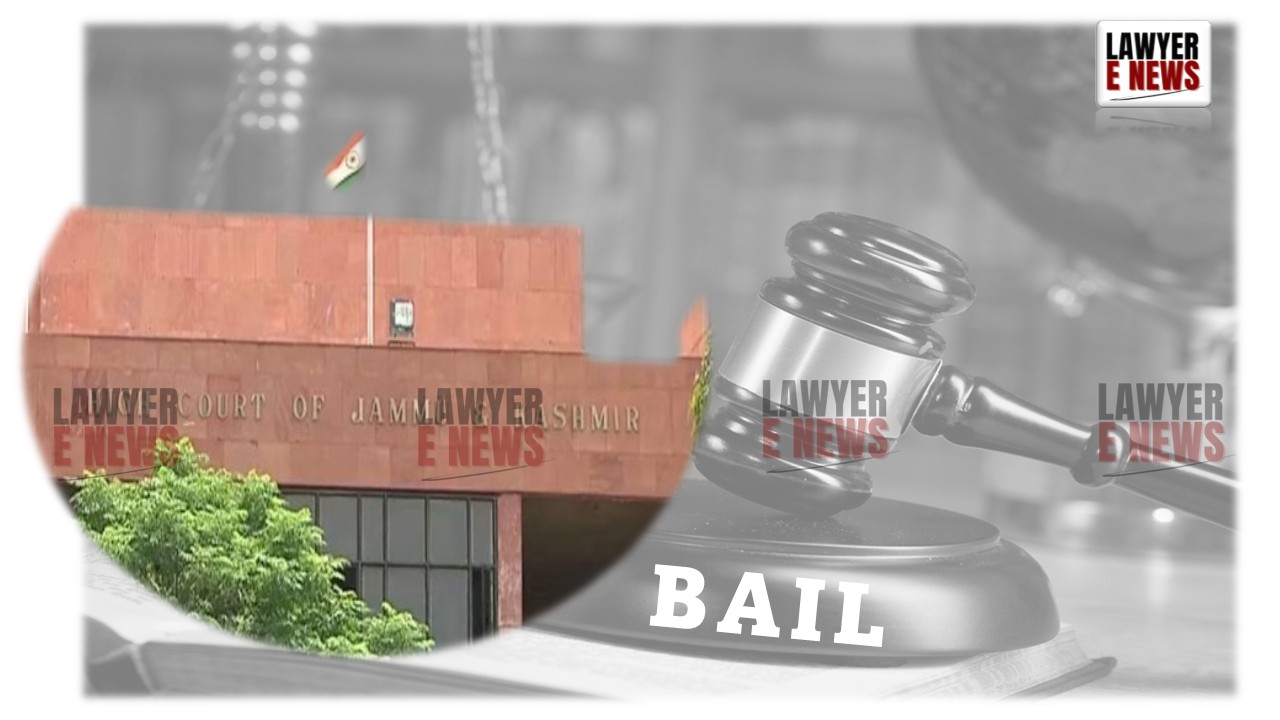-
by Admin
18 February 2026 4:35 AM



High Court of Jammu & Kashmir and Ladakh dismissed the bail appeal of Javaid Ahmad Bhat, accused of harbouring and conspiring with foreign terrorists associated with the proscribed organization Lashkar-e-Toiba. The Court held that the statutory bar under Section 43D(5) of the Unlawful Activities (Prevention) Act, 1967 (UAPA) was fully attracted and that, “when prima facie involvement is established under Chapters IV and VI of UAPA, the accused cannot be enlarged on bail.”
The Bench comprising Chief Justice Tashi Rabstan and Justice M.A. Chowdhary rejected the appellant’s argument that the trial court had erred in refusing bail, observing instead, “The rigour of Section 43D(5) of UAPA is attracted and the appellant has been prima facie found involved in the commission of offences under Chapters IV and VI of the UAPA.”
The appellant, Javaid Ahmad Bhat, through his father, filed an appeal under Section 21 of the National Investigation Agency Act, 2008, read with Section 483 of the Bharatiya Nagarik Suraksha Sanhita, 2023, challenging the order of rejection of bail dated 19.12.2024 passed by the Special NIA Court, Srinagar.
The prosecution case alleged that the appellant had harboured two foreign terrorists who had entered Jammu & Kashmir illegally and stayed initially in the appellant’s hotel and later in his personal residence.
It was further alleged that, during this period, the terrorists, using the shelter and support provided by the appellant, committed a brutal attack resulting in the death of two CRPF personnel at Maisuma, Srinagar, and were later neutralized during an encounter.
Challenging the order, the appellant contended that, “there is no evidence against him except his own statement recorded in police custody, which by itself is not sufficient to deny bail.” The counsel further argued, “the rigour of Section 43D(5) is not attracted as no witness has deposed anything adverse against the appellant.” It was also claimed that, “the accused has been in jail for two years and keeping him incarcerated amounts to pre-trial punishment.”
The Court categorically held that, “the appellant has been charged for the commission of offences punishable under Sections 13, 18, 19, and 39 of the UAPA, and the offences under Sections 18 and 19 fall under Chapter IV, whereas Section 39 falls under Chapter VI of the UAPA.”
Referring to Section 43D(5) of UAPA, the Court explained, “the statutory embargo clearly states that bail cannot be granted if the court finds reasonable grounds for believing that accusations are prima facie true.”
Dealing with the argument that the rigour of Section 43D(5) does not apply, the Court clarified, “The contention raised by the learned counsel for the appellant that the rigour of the section is not attracted pales into insignificance as the appellant is stated to have been charged for the commission of offences punishable under Sections 18 and 19 falling under Chapter IV and Section 39 falling under Chapter VI of the UAPA.”
The Court strongly reinforced the principle that bail in UAPA cases stands on a different footing. It observed, “At the stage of bail, neither the trial court nor the appellate court is supposed to undertake a meticulous examination of evidence. Only a prima facie case needs to be established to attract the rigour of Section 43D(5).”
The Court held, “the Special Court has considered every argument advanced on behalf of the appellant and after a thorough and reasoned order, rejected the bail application.”
In response to the argument about prolonged incarceration, the Court remarked, “the gravity of allegations and the established involvement of the accused in the chain of conspiracy and harbouring terrorists weigh against the grant of bail.”
The Bench also noted, “The allegations show that the appellant knowingly provided shelter to two foreign terrorists, arranged SIM cards, and continued to facilitate their stay even after becoming aware of their identity as terrorists.”
Upholding the Special Judge’s rejection of bail, the Court concluded, “This Court, after hearing both the sides, perusal of charge-sheet and other incriminating material, while exercising appellate jurisdiction, does not find any illegality or perversity in the impugned order.”
Accordingly, the appeal was dismissed.
Date of Decision: 03 April 2025
